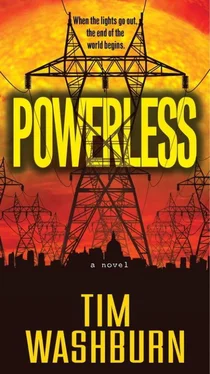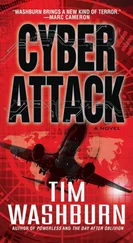“That’s strange,” Zeke says.
“What’s that, son?”
“The lights. When Dad and I were working in the shop the lights flickered on and off a couple of times. We thought the issue was isolated to our area—”
“Marshall family?” a tall black nurse says, using the heel of her tennis shoe to hold open the door. She’s dressed in purple scrubs with a stethoscope hanging around her neck.
Zeke waves, then takes his mother by the elbow to help her up from the chair and leads her across the lobby.
“If you’ll follow me, I’ll take you back to the ICU,” the nurse says.
They fall in behind her as she ushers them down the hall.
“What happened to my father?” Zeke asks.
“The doctor will explain, but I will tell you Mr. Marshall suffered a heart attack.”
Barbara Marshall inhales an audible breath. Zeke slides his arm around her.
The hallway is lit with green-tinged fluorescent lights that reflect on the polished linoleum. As they shuffle past other patients’ rooms, Zeke resists the urge to peek inside. The nurse stops at a door and ushers them into the room.
Zeke pulls up short, struggling to contain his shock at the number of tubes and wires snaking toward his father. His father is awake and smiles weakly. His mother shrugs off Zeke’s arm and moves to his bedside.
Zeke turns to find another man in the room. Dark haired with dark skin, the man is in his midthirties, short and diminutive, with a white coat draped over his narrow shoulders. Zeke offers his hand.
“I’m Dr. Ahmed, and I’ll be taking care of your father.”
For the second time in as many minutes, Zeke works to conceal his surprise. In Afghanistan, and all through the desert, he met many Ahmeds. And most weren’t pleasant encounters. The doctor’s name, along with the familiar accent, puts Zeke on edge. “I’m Zeke Marshall and that’s my mother, Barbara. Thanks for looking after my dad. Can you explain what happened?”
“Mr. Marshall has suffered a myocardial infarction, a heart attack. We are monitoring his heart through the use of an ECG machine, which measures the heart’s electrical activity—”
“How bad was the heart attack?”
Anger flickers in the doctor’s eyes. “I’m waiting for the blood work, which should be completed anytime. But, from looking at the ECG, I believe your father is a lucky man, having suffered a non–ST segment elevation myocardial infarction—”
“In English, please.”
“I’m sorry, sir. May I continue?”
Zeke nods.
“As I was saying, not that any heart attack is good, mind you, but this type does less damage to the heart muscle.”
“What could have caused the heart attack?” Zeke asks.
“A blockage in the arteries leading to the heart muscle. I administered a thrombolysis immediately upon his arrival to the emergency room. It is a clot-dissolving agent which helps restore blood flow and prevent further damage to the heart.”
Zeke says, “So what’s next? How do we treat the blockage?”
“Once your father is stabilized, I will send him for an arteriogram to discover how much blockage and in which coronary arteries. The doctors upstairs will be able to reduce the blockage using angioplasty and insertion of stents that will keep the arteries open.”
“When are you scheduling the test?” Zeke says.
“Hopefully later this evening, if he has no more unusual ECG readings. I’ll be back soon to check on your father while the nurses schedule the arteriogram.” The doctor turns toward the door, then stops and turns back. “I understand you administered aspirin to your father at the scene.”
Zeke nods.
“Probably saved his life,” Ahmed says before exiting the room.
Zeke steps up to his father’s bedside, not knowing how to express his feelings without it being awkward. “So much for all the jogging you used to do.”
TransJet Flight 62, south of Greenland
Wednesday, September 29, 11:45 A.M.
Captain Steve Henderson wipes the palm of his hand across his pant leg. Flight 62 is still some distance from landfall on the coast of Ireland. His copilot, Cheryl Wilson, is slowly dialing through the radio frequencies in search of a human voice. The loss of the autopilot has the captain glued to his instruments, trying to maintain a consistent speed and altitude. They’re forced to navigate by compass and map, something neither has done since they were flying Cessna 172s back in high school.
“Holding altitude and speed are fine, Steve, but what are we going to do when we begin the landing process?” Wilson says.
The captain looks away from the instruments long enough to see the fear on her face. Cheryl Wilson looks younger than she is, with black hair streaked blond and cut in an even line just above the shoulders. “Pray, I guess. Other than that, we can only hope the home office is aware of our loss of radio contact and navigation abilities, and is working to establish communications with us on landfall.”
“What if they can’t?”
Henderson sighs. “You’re killing me with all these questions, Cheryl. All I can do is drive the damn plane.” He glances at the altimeter again. The air corridor they are flying is the main flight path for flights between Europe and the United States, often with jumbo jets within just a few thousand feet of one another. He turns back to his copilot. “Look, I’m sorry, babe. I’m a little stressed at the moment.”
Cheryl says, “What if we detour north and put it down in Reykjavik?”
“What if every other plane in transit has the same idea? Without radio communications or any way to navigate, that would turn into a clusterfuck. I think our best course of action is to continue on to the UK and hope we can reestablish radio contact.”
Cheryl turns away to stare out the windscreen.
“Listen, Cheryl, we need to work together on this.”
Cheryl nods and reaches over the console to rub his shoulder. “Should we inform the flight attendants about the situation?”
“Hell no.”
Cheryl yanks her hand back. “Why not? You don’t think they have a right to know what’s happening?”
“Not until we know what the hell’s happening. The last thing we need is an airplane full of distressed passengers.”
She shakes her head and looks away.
Steve turns back to the instruments, thinking: the last thing we need is a lovers’ quarrel in the cockpit of a plane flying blind .
The Oval Office
Wednesday, September 29, 11:55 A.M.
All thoughts of an address to the nation are put on hold as the President and his advisors work the phones in search of a solution to the impending disaster in New Orleans. The entry to the Oval Office is a revolving door with people streaming in and out, but no one has come up with a viable alternative. If it were just an electricity issue they could use generators to power the pumps, but the motors themselves are shot. In between calls, President Harris keeps a close eye on the television where the coverage of the collision at the Seattle airport continues.
The President hangs up the phone and looks over at his chief of staff. “This is just the beginning.”
Scott nods. “We’re doing everything that can be done.”
The President lowers his voice. “We’re fucked, Scott. Hell, we can’t even help one small area of the country. What’s going to happen when the entire nation is without power?”
“What are we going to do to stop it? We can’t. We’ll just have to do the best we can.”
One of the staffers turns up the volume on the television. The CNN reporter is speaking. “Susan, we’ve learned that the two aircraft involved were 737-600s, each capable of carrying a hundred and thirty-two passengers along with five crewmembers. No word yet on the number of injured, and firefighters are still trying to contain the fires that continue to rage from spilled jet fuel. We’ve just received word that all flights are now grounded. No reason was given for the grounding, but one would think the disruption in radio communications, such as happened here, may be the overriding reason. I have called numerous sources but…”
Читать дальше












